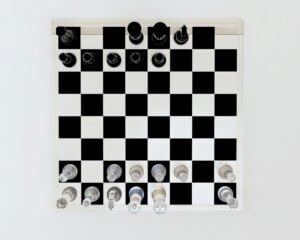Abuse of a dominant position is one of the main breaches of competition law. Among its manifestations, exclusionary abuses are particularly damaging to the functioning of markets. These practices, implemented by companies in a dominant position, are aimed at eliminating existing competitors or preventing new players from entering the market. Our firm is regularly called upon by companies that are victims of such anti-competitive behaviour, but also by dominant companies wishing to secure their commercial practices. This article details the different types of exclusionary abuse and their legal characteristics.
Understanding the concept of exclusionary abuse in competition law
Definition: ousting competitors by means other than merit
Abuse of exclusion refers to behaviour by a company in a dominant position which tends to oust its competitors by means other than those of normal competition based on the merits. According to the Autorité de la concurrence, these practices are "likely to influence the structure of a market where, precisely as a result of the presence of the undertaking in question, the degree of competition is already weakened" (Decision 22-D-06, 22 February 2022).
Article L. 420-2 of the French Commercial Code prohibits these practices under French law, while Article 102 of the Treaty on the Functioning of the European Union (TFEU) prohibits them at European level.
A dominant undertaking has a "special responsibility" not to undermine effective competition. As the Court of Justice of the European Union has pointed out, certain types of behaviour, which would be legitimate in a normal context of competition, may constitute abuse when committed by a dominant undertaking.
Distinction from abuse of exploitation
It is essential to distinguish abuse of exclusion from abuse of exploitation, the other main category of abuse of a dominant position. Whereas exclusionary abuse is aimed at eliminating competitorsThe abuse of exploitation consists of the dominant undertaking imposing excessive or unfair trading conditions on its commercial partners, customers or suppliers.
Exclusionary abuses mainly affect the competitive structure of the market, whereas exploitative abuses directly affect the dominant undertaking's trading partners. In the former case, the harm to consumers is often indirect and longer-term (reduced choice, higher prices), while in the latter it is generally immediate (excessive prices, unbalanced contractual conditions).
The two types of abuse can sometimes be combined. For example, a practice of discriminatory pricing may constitute both an abuse of exploitation vis-à-vis disadvantaged customers and an abuse of exclusion by weakening the competitive position of certain operators on the market.
Contractual exclusivity practices
Exclusive supply agreements: analysis and conditions of abuse
Exclusive supply agreements oblige a customer to obtain all or a significant proportion of its requirements from the dominant undertaking. Such agreements are not automatically unlawful, but may constitute an abuse when they foreclose the market.
According to the Hoffmann-La Roche ruling of the Court of Justice (judgment of 13 February 1979), such agreements are presumed to be abusive because they "tend to deprive the purchaser of the possibility of choosing his sources of supply and to bar other producers from entering the market".
However, decision-making practice has evolved towards a more economic analysis, taking into account various factors: the scope of the exclusivity, its duration, the conditions for termination and renewal, the position of the operators and market conditions. As the Autorité de la concurrence has pointed out, "exclusivity clauses are likely to produce foreclosure effects whatever the duration of the contractual commitment. However, the longer the duration, the more serious the effects" (Decision 08-D-16).
Exclusive agreements may be justified by efficiency gains, particularly if they are necessary to ensure the profitability of an activity due to specific investments or the risky nature of the activity.
Loyalty or exclusivity discounts: a presumption of abuse?
Loyalty discounts, granted by a dominant undertaking in return for exclusive or quasi-exclusive supply, may also constitute an abuse of exclusion. The Autorité de la concurrence distinguishes three categories of discounts:
- Quantity discounts, linked exclusively to the volume of purchases and generally considered to be lawful
- Loyalty or exclusivity discounts, which are presumed to be anti-competitive because they are based on a logic of exclusive supply
- Intermediary discounts, the legality of which is assessed on a case-by-case basis
Loyalty discounts are particularly problematic when they have a loyalty or "suck-in" effect that prevents customers from switching to competitors. The Autorité de la concurrence uses the "equally efficient competitor test" to determine whether a discount is likely to drive out competitors that are as efficient as the dominant undertaking.
However, even a discount that is presumed to be abusive may be justified if the undertaking demonstrates that it produces efficiencies that benefit consumers. The burden of proof lies with the dominant undertaking.
Tying and bundling: when coupling becomes abusive
Tying and bundling are another form of exclusionary abuse. Tying forces a customer who wishes to purchase a product (the tying product) to also purchase another product (the tied product). Bundling consists of offering several products together, either purely (the products are only sold together) or mixed (the products are also available separately, but the bundled price is lower than the sum of the individual prices).
According to the Autorité de la Concurrence, four cumulative conditions are required to qualify a coupling as abusive:
- The company must be dominant on the binder product market
- Binder and bonded products must be two separate products
- Customers must not be able to obtain the binding product without the bound product.
- The practice must be likely to restrict competition
The Nespresso case (Decision 14-D-09) illustrates this analysis: the Autorité considered that coffee machines (tying product) and capsules (tied product) were distinct products, and that Nespresso's practices could have a predatory effect on the market for compatible capsules.
Tying may, however, be justified on legitimate grounds, such as guaranteeing quality or achieving efficiency gains. For example, the Autorité has accepted that "convergence" offers combining mobile telephony and the Internet could benefit consumers (Decision 09-D-15).
Exclusionary predatory pricing strategies
Predator pricing: definition and cost test (black, grey and white zones)
Predation means that a dominant company charges abnormally low prices, deliberately incurring losses in the short term, in order to eliminate a competitor. This strategy is only rational if the company can hope to recoup its losses later, once the competitor has been eliminated, by raising its prices.
To determine whether a price is predatory, the Autorité de la concurrence applies a "cost test" that compares the price charged with different levels of the dominant undertaking's costs. It distinguishes three zones:
- Black" zone: prices below average variable costs (or average avoidable costs). The Authority presumes abuse, with no need to prove intent to evict.
- Grey" zone: prices above average variable costs but below average total costs. The practice is abusive if there is evidence of a predatory strategy.
- White" zone: prices above average total costs. The practice is presumed to be lawful.
In the case of multi-product companies or those entrusted with a public service mission, the test is adapted using the notion of "incremental cost", which only takes into account costs specifically linked to the activity in question.
Predatory pricing: going beyond predation
In addition to predatory pricing, the Autorité de la concurrence recognises the broader concept of "predatory pricing". These are prices which, without necessarily being below cost (like predatory prices), are likely to drive out competitors who are as efficient as the dominant undertaking.
As the Autorité emphasised, "any pricing behaviour by an operator in a dominant position that has an actual or potential effect of crowding out competitors considered to be equally efficient restricts competition" (Decision 12-D-25). To establish the existence of a predatory price, the analysis is based in particular on the "equally efficient competitor test".
In the L'Équipe newspaper case (Decision 14-D-02), the Autorité considered that the launch of a second low-priced sports daily by the dominant group constituted a strategy of elimination aimed at eliminating a new market entrant.
Margin squeeze: mechanism and conditions
Margin squeeze is a practice implemented by a vertically integrated company present both on an upstream market where it holds a dominant position and on a competitive downstream market. It consists of setting its wholesale (upstream) prices at such a level that its competitors on the downstream market cannot replicate them without incurring losses.
According to the Court of Cassation, "a price squeeze practice has an anti-competitive effect if a potential competitor that is as efficient as the dominant vertically integrated undertaking that engaged in the practice can only enter the downstream market by incurring losses" (Court of Cassation, 3 March 2009).
To establish the existence of an abusive price squeeze, the Autorité de la concurrence requires a number of conditions:
- The company must have a dominant position on the upstream market
- The upstream service must be essential for access to the downstream market
- The difference between the wholesale price and the retail price must be insufficient to allow an equally efficient competitor to cover its costs.
In its decision 09-D-24, the Autorité fined France Télécom for practising price squeezing on the high-speed Internet market in the French overseas departments, by offering retail services at prices lower than those of the wholesale services needed to replicate them.
Discriminatory pricing as a tool of eviction
A company in a dominant position can also abuse this position by charging discriminatory prices, i.e. by applying different conditions to equivalent services. These practices can have a crowding-out effect when they put certain competitors at a disadvantage.
The most significant example concerns the differentiation in rates between "on net" telephone calls (to the same network) and "off net" calls (to other networks). The Autorité de la concurrence considered that this practice could create a "club effect" favouring operators with the largest subscriber base and hindering the development of smaller operators (Decision 12-D-24).
To be justified, price discrimination must be based on objective differences in costs. A dominant undertaking cannot claim that its internal transfer costs are lower than those it charges its competitors, as this would be tantamount to deriving an anti-competitive advantage from its dominant position.
Refusal to contract as an abuse of exclusion
Refusal to buy or sell: conditions for abuse
In principle, contractual freedom allows any company to choose its commercial partners. However, when a company is in a dominant position, a refusal to sell or buy may constitute an abuse if certain conditions are met.
According to the French Competition Authority, "a dominant undertaking exploits its position abusively when it refuses to supply goods or services in order to limit or exclude its actual or potential competitors from a given market and to strengthen its position on that market, without this refusal being objectively justified" (Decision 05-D-72).
The unfairness of a refusal to enter into a contract is assessed on the basis of three criteria:
- The indispensable nature of the product or service refused
- The elimination of all effective competition resulting from the refusal
- Lack of objective justification
For example, the Autorité considered as abusive a manufacturer's refusal to sell to a competitor a component that it alone manufactured and whose integration was required in public tenders (Decision 10-D-39).
The specific case of denial of access to essential infrastructure
A particular form of refusal to contract concerns refusal of access to "essential infrastructure". This concept refers to a facility or equipment that is essential for access to a market and cannot be duplicated under reasonable economic conditions.
For the Autorité de la concurrence, four cumulative conditions characterise essential infrastructure:
- The installation cannot be reproduced under reasonable conditions
- Access is refused or subject to unjustified restrictive conditions
- Access is technically possible
- Access is strictly necessary to carry out a competitive activity on a related market
When these conditions are met, the refusal of access constitutes an abuse of a dominant position. For example, in its decision 15-D-10, the Autorité fined TDF for being late in providing essential information to its competitors concerning the Eiffel Tower site, considered to be an essential infrastructure for audiovisual broadcasting.
It should be noted, however, that the theory of essential infrastructure is applied restrictively, so as not to discourage innovation and investment.
Unfair termination of an established commercial relationship
In principle, a company in a dominant position is free to terminate its commercial relationship. However, the abrupt termination of an established commercial relationship may constitute an abuse when it has an anti-competitive purpose or effect.
To assess whether a termination is unfair, the AMF will examine, in particular :
- The existence of alternatives for the commercial partner
- Giving reasonable notice
- The objective pursued by the dominant undertaking
In its decision 04-D-26, the Autorité sanctioned a practice which "had the object and effect of causing the disappearance of a retailer and destabilising the downstream market", thereby constituting an abuse of a dominant position.
Disruption can be particularly problematic when it concerns access to an essential resource, as in the case of the distribution of products with a high profile or which benefit from intellectual property protection.
Other exclusionary practices
Reserving resources (withholding information, reserving infrastructure)
A company in a dominant position can also abuse this position by reserving for itself the exclusive use of certain resources necessary to the exercise of a competitive activity, in particular strategic information or infrastructures.
Withholding information constitutes an abuse when this information is essential to the activity of competitors and its late, imprecise or incomplete communication creates an asymmetry of information that is prejudicial to competition. For example, the AMF sanctioned SNCF for passing on to its freight division confidential information obtained as part of its role as infrastructure manager (Decision 12-D-25).
Similarly, the reservation of infrastructure may be abusive. In the rail sector, the Autorité ruled that the practice of making rail capacity (train paths) unavailable without objective justification, thereby preventing competitors from entering the market, was abusive (Decision 12-D-25).
These practices are particularly serious when they are carried out by companies that have emerged from former public monopolies, which enjoy advantages inherited from their previous situation that cannot be reproduced by their competitors.
Denigration and other attacks on competitors' reputations
Denigration is a form of exclusionary abuse when practised by a company in a dominant position. It consists of publicly discrediting a competitor or its products or services.
The Autorité defines denigration as "the act of publicly discrediting an identified person, product or service. It differs from criticism in that it emanates from an economic player seeking to gain a competitive advantage by penalising its competitor" (Decision 20-D-11).
To establish the existence of abusive denigration, the Authority will examine :
- If the sales pitch is based on objective findings or unverified assertions
- The actual or potential effects of this speech on market structure
- The link between corporate domination and the practice of denigration
The pharmaceutical sector offers numerous examples of abusive denigration, particularly concerning generic medicines. The Autorité has sanctioned pharmaceutical companies for implementing strategies designed to cast doubt on the quality and efficacy of competing generics (Decisions 13-D-11 and 13-D-21).
The reputation of the dominant company is an aggravating factor, as it reinforces the impact of the disparaging discourse on market players.
Identifying and challenging abusive exclusions
If your company is the victim of exclusionary abuse, there are several avenues of redress open to you. You can refer the matter to the French Competition Authority, which has powers of investigation, sanction (fines of up to 10% of worldwide sales) and injunction. A precautionary measures procedure can also be used to obtain rapid emergency measures in the event of imminent damage.
At the same time or alternatively, you can take action before the civil or commercial courts to obtain the nullity of abusive practices and compensation for your loss. European Directive 2014/104/EU, transposed into French law, has strengthened the effectiveness of private actions for compensation for anti-competitive practices.
Identifying exclusionary abuse requires detailed analysis relevant market and dominant position of the company involved. This analysis requires in-depth legal and economic expertise, as well as knowledge of the specific features of each sector.
Conversely, if your company is in a dominant position, it is essential to have regular checks carried out to ensure that your commercial practices comply with competition law. A dominant position is not prohibited per se, but it does require particular vigilance with regard to behaviour that could be classified as abusive.
For understanding abuse of a dominant position and prohibited practices or defending yourself against abuseOur firm offers you personalised support in both prevention and litigation.
If you are faced with a situation that could potentially constitute an abuse of exclusion, do not hesitate to contact our firm for an in-depth legal analysis and a strategy tailored to your situation.
Sources
- French Commercial Code, Article L. 420-2
- Treaty on the Functioning of the European Union, article 102
- Autorité de la concurrence, Decisions 22-D-06, 08-D-16, 14-D-09, 09-D-15, 12-D-25, 14-D-02, 09-D-24, 12-D-24, 10-D-39, 15-D-10, 04-D-26, 20-D-11, 13-D-11, 13-D-21
- ECJ, Hoffmann-La Roche judgment, 13 February 1979
- Court of Cassation, ruling of 3 March 2009, Tenor




